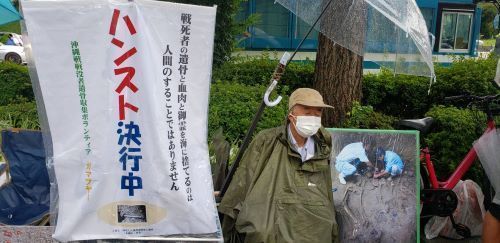“Respect the War Dead” Gushiken’s Hunger Strike in Front of Yasukuni Shrine on Memorial Day for the End of the War Draws Attention to the Issue of War Dead Remains at Okinawan Battleground

Takamatsu Gushiken on hunger strike, calling for a halt in plans to use soil from the southern part of Okinawa’s main island, where there are still remains of the war dead that haven’t been found, in the land reclamation for the construction of the new base at Henoko. (August 15, Chiyoda, Tokyo)
August 15, 2021 Ryukyu Shimpo
Tokyo – On August 15, Memorial Day for the End of the War, Takamatsu Gushiken continued his hunger strike in front of the Nippon Budokan in Chiyoda. He began the hunger strike on August 14. Gushiken is a representative of the Gamafuya, a group of volunteers who search for the remains of those who died in the Battle of Okinawa. Addressing those attending the National Memorial Service for the War Dead and the relatives of the war dead who were paying their respects at Yasukuni Shrine, Gushiken called for a halt in plans to use soil from the southern part of Okinawa’s main island, where there are still remains of the war dead that haven’t been found, in the land reclamation for the construction of the new base at Henoko.
Gushiken, who has been subsisting on only water and tea since August 14, protested silently, sometimes in pouring rain. He says, “A lot of people asked me why I was there, and many of them didn’t know anything about this issue.” He clearly saw that there is a vast difference in how Okinawans and people in Honshu feel about the issue. He adds, “Two years ago, I was here calling for DNA testing on the remains, but the Ministry of Defense seems to be moving away from DNA testing, which is a national undertaking. Today is a day for us to honor those who died in the war, so today, in particular, I want the people of mainland Japan to learn about this issue.”
On August 15, people who agree Gushiken’s work helped gather support by holding banners and passing out flyers demanding a halt in the plans to use the soil. Hiroshi Tamura came from Chiba to participate in the protest. His father was deployed and died in battle in the southern part of Okinawa’s main island. Tamura continues to visit Okinawa three to four times each year, searching for his father’s remains with Gushiken. He says, “I was three at the time, and have almost no memories of my father, so for me, his remains are proof that my father lived. The Ministry of Defense’s plan robs families of the war dead of the chance to find their family member’s remains. It’s unforgivable.”
(English translation by T&CT and Ellen Huntley)
Previous Article:Okinawa has had zero extremely hot days this year despite being so far south, why is this?
Next Article:Fallen component from Osprey aircraft exceeds one meter in size, according to U.S. military
[Similar Articles]
- Over 30,000 signatures calling for Japanese Government to halt plans to use soil from Southern Okinawa Island, Gamafuya representative Gushiken also calls for DNA testing on remains
- Urgent youth statement calling for halt in plans to obtain soil published online: “Support for Gushiken’s hunger strike”
- “Using soil mixed with human remains is a desecration of the dead”: Gamafuya submits letter to OPG requesting disapproval of soil use in Henoko construction
- “Help the remains” Takamatsu Gushiken begins hunger strike in protest of of plan to use soil from southern Okinawa in Henoko land reclamation
- Prefectural assembly asks that soil containing war dead remains not be used in land reclamation
 Webcam(Kokusai Street)
Webcam(Kokusai Street)


